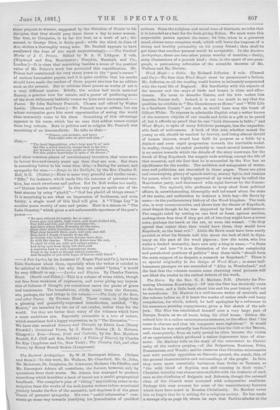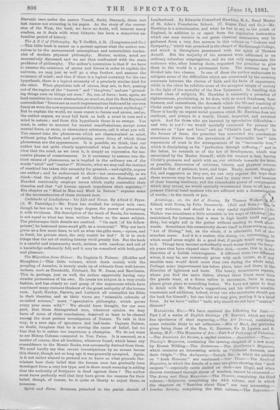The Slays. By the Rev. G. F. Maclear, D.D. (Society
for Pro- moting Christian Knowledge.)—Of late the Slav has decidedly come to the front, and a little book about him and his past history will not be unwelcome. Dr. Maclear is a well-known writer of manuals, and the volume before us, if it bears the marks of rather crude and hasty compilation, for which, indeed, he half apologises by a reference to his numerous pressing engagements, gives a fair sketch of the sub- ject. The Slav has established himself over a very largo part of Europe, Russia, as we all know, being his chief home. Gibbon dis- missed him in a rather contemptuous sentence, to the effect that "his name is obscure and that his conquests were inglorious." It would seem that he was naturally loss ferocious than the Colt or the Teuton, and, consequently, from an early period he often became the victim of an oppression which produced a rather degenerate typo of char- acter. Dr. Maclear tells us the story of the conversion to Christi- anity of the various peoples,—of the Bulgarians, Russians, Poles, Pomeranians, and Wends ; and he observes that Christian missionaries met with peculiar opposition on Slavonic ground, the result, this, of the general characteristics and surroundings of the people. In fact, they were more essentially barbarous than Goths or Teutons, as "the wild blood of Scythia was still coursing in their veins." Christian morality was almost irreconcilable with the instincts of such men as the chieftains of Bulgaria and Bohemia, though the outward rites of the Church were accepted with comparative readiness. Perhaps this may account for some of the unsatisfactory features which, have been noted in Russian Christianity. Dr. Maclear never lets us forgot that ho is writing for a religious society. He has made a strange slip on page 10, where he says that Tacitus alludes to the
Slavonic race under the names Venedi, Serbi, Stavanij, these two last names not occurring in his pages. As the story of the conver- sion of the West, the book, wo have no doubt, will interest many readers, as it deals with what hitherto has been a somewhat un- familiar period of history

































 Previous page
Previous page